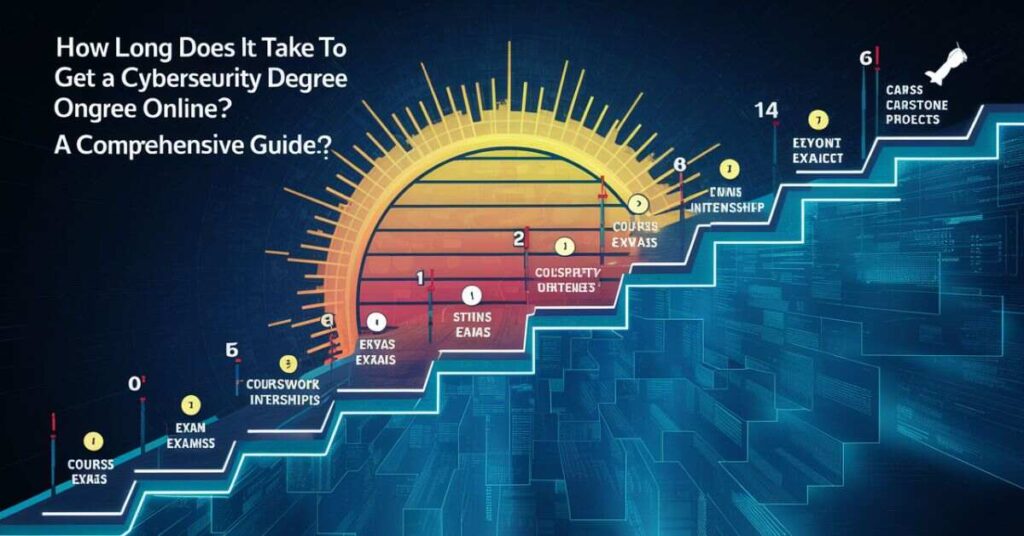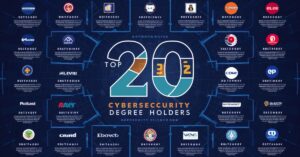In today’s digital age, cybersecurity has become a critical concern for businesses, governments, and individuals alike. As cyber threats evolve and become more sophisticated, the demand for skilled cybersecurity professionals continues to soar. If you’re considering a career in this dynamic field, you might be wondering: How long does it take to get a cybersecurity degree online? This comprehensive guide will explore the ins and outs of online cybersecurity education, including program duration, benefits, career prospects, and much more.
Benefits of a Cybersecurity Online Program
Online cybersecurity degree programs offer numerous advantages over traditional on-campus options. These benefits include:
- Flexibility and convenience: Study from anywhere, at any time, allowing you to balance your education with work and personal commitments.
- Cost-effectiveness: Online programs often have lower tuition fees and eliminate costs associated with commuting or on-campus housing.
- Access to cutting-edge curriculum: Online programs can quickly adapt to the rapidly evolving cybersecurity landscape, ensuring you learn the most up-to-date skills and knowledge.
- Industry-experienced faculty: Many online programs feature instructors who are active professionals in the cybersecurity field, providing real-world insights and networking opportunities.
- Global networking: Interact with peers from around the world, broadening your perspective and expanding your professional network.
Can I Earn My Degree in Less Time Than Four Years?
While a traditional bachelor’s degree in cybersecurity typically takes four years to complete, online programs often offer accelerated options that can significantly reduce the time it takes to earn your degree. Here are some ways you might be able to fast-track your cybersecurity education:
- Accelerated programs: Some online schools offer intensive, year-round study options that allow you to complete your degree in as little as 2.5 to 3 years.
- Credit transfer: If you have previous college credits or an associate’s degree, you may be able to transfer these credits and shorten your program duration.
- Prior learning assessments: Some institutions offer credit for work experience or military training related to cybersecurity.
- Year-round study: Many online programs offer courses throughout the year, allowing you to continue your studies during traditional break periods.
“The flexibility of online learning allowed me to complete my cybersecurity degree in just three years while working full-time. It was challenging, but definitely worth it!” – Sarah Thompson, Cybersecurity Analyst
Is a Cybersecurity Degree Online Worth It?
Investing in an online cybersecurity degree can be highly rewarding, both personally and professionally. Here’s why:
- Growing demand: The U.S. Bureau of Labor Statistics projects a 31% growth in information security analyst jobs from 2019 to 2029, much faster than the average for all occupations.
- Competitive salaries: Cybersecurity professionals often command high salaries due to the specialized nature of their work.
- Career advancement: A degree can open doors to leadership positions and specialized roles in the field.
- Industry recognition: Online degrees from accredited institutions are widely accepted and respected in the cybersecurity industry.
What Do You Learn in a Cybersecurity Degree Online?
A comprehensive online cybersecurity degree program typically covers a wide range of topics essential for success in the field. Here’s a snapshot of what you can expect to learn:
| Core Topics | Advanced Concepts | Specialized Skills |
|---|---|---|
| Network security | Ethical hacking | Incident response |
| Cryptography | Penetration testing | Digital forensics |
| Information assurance | Cyber law and policy | Threat intelligence |
| Operating system security | Cloud security | Malware analysis |
| Database security | Mobile device security | Security architecture |
In addition to these technical skills, most programs also emphasize critical thinking, problem-solving, and communication skills, which are crucial for success in the cybersecurity field.
What Can You Do With a Cybersecurity Degree Online?

An online cybersecurity degree can open doors to a variety of exciting and lucrative career paths. Some popular roles include:
- Information Security Analyst: Protect an organization’s computer networks and systems.
- Cybersecurity Consultant: Advise clients on best practices for securing their digital assets.
- Network Security Engineer: Design and implement secure network solutions.
- Incident Response Specialist: Lead the charge in responding to and mitigating cyber attacks.
- Chief Information Security Officer (CISO): Oversee an organization’s overall information security strategy.
How long does it take to learn cybersecurity for beginners?
For beginners, the journey to becoming proficient in cybersecurity can vary depending on your background and learning intensity. Here are some options:
- Entry-level certifications: Courses like CompTIA Security+ can be completed in a few months of dedicated study.
- Bootcamps: Intensive programs lasting 12-24 weeks can provide a solid foundation in cybersecurity basics.
- Self-paced learning: With online resources and practice labs, motivated learners can gain fundamental skills in 6-12 months.
Remember, hands-on experience is crucial in cybersecurity. Consider participating in capture-the-flag (CTF) competitions or setting up a home lab to practice your skills.
Cyber Security Salary
Cybersecurity professionals often enjoy competitive salaries due to the high demand for their skills. Here’s a breakdown of average salaries by experience level in the USA:
- Entry-level (0-2 years): $60,000 – $80,000
- Mid-level (3-5 years): $80,000 – $120,000
- Senior-level (6+ years): $120,000 – $200,000+
Factors influencing cybersecurity salaries include location, industry, certifications, and specific skill sets. High-paying roles like CISOs can command salaries well over $200,000 in major tech hubs.
How long does it take to become a cybersecurity engineer?

Becoming a cybersecurity engineer typically involves:
- Education: 4 years for a bachelor’s degree or 2-3 years for an associate’s degree plus additional certifications.
- Certifications: Popular options like CISSP or CEH can take 3-6 months of preparation each.
- Experience: Most employers require 2-5 years of relevant IT or security experience.
In total, it may take 5-7 years to become a fully qualified cybersecurity engineer, depending on your educational path and how quickly you gain experience.
How long does it take to get a master’s degree in cybersecurity?
Master’s programs in cybersecurity typically take:
- Full-time: 1-2 years
- Part-time: 2-3 years
- Accelerated: Some programs offer intensive options that can be completed in as little as 12-18 months
The duration can vary based on factors such as thesis requirements and prior experience. Some programs offer flexible options that allow you to adjust your course load based on your schedule and commitments.
FAQs
How fast can you get a cybersecurity degree?
The fastest path to a cybersecurity degree is typically through an accelerated online program, which can be completed in as little as 2.5 to 3 years for a bachelor’s degree. However, the speed at which you can complete your degree depends on factors such as transfer credits, prior learning assessments, and your ability to handle an intensive course load.
Can I learn cyber security in 6 months?
While it’s possible to gain a foundational understanding of cybersecurity in 6 months through intensive boot camps or self-study, becoming a well-rounded professional typically requires more time and hands-on experience. Six months can be sufficient to prepare for entry-level certifications or to gain basic skills, but developing the expertise required for most cybersecurity roles usually takes longer.
Is a cyber security degree hard?
A cybersecurity degree can be challenging due to the technical nature of the field and the constantly evolving threat landscape. However, with dedication and the right mindset, it’s certainly achievable. Key factors for success include:
- Strong problem-solving skills
- Attention to detail
- Passion for technology and security
- Willingness to continuously learn and adapt
Is cyber security harder than coding?
Cybersecurity and coding are different disciplines with their challenges. While cybersecurity requires some coding knowledge, it also involves a broader understanding of systems, networks, and security principles. Some may find cybersecurity more challenging due to its interdisciplinary nature and the need to stay updated with rapidly evolving threats. Others might find coding more difficult due to its focus on abstract thinking and algorithmic problem-solving.
Conclusion
The journey to obtaining a cybersecurity degree online can be as short as 2.5 years or as long as 4+ years, depending on various factors such as program intensity, prior experience, and personal circumstances. Regardless of the duration, an online cybersecurity degree offers a flexible, cost-effective path to a rewarding career in a high-demand field.
As cyber threats continue to evolve, the need for skilled cybersecurity professionals will only grow. By investing in your education through an online cybersecurity degree program, you’re not just earning a diploma – you’re preparing yourself for a dynamic, challenging, and potentially lucrative career protecting the digital assets that power our modern world.








